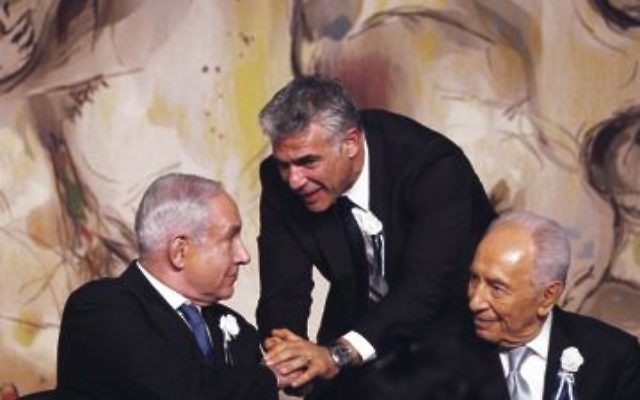Knesset convenes with fresh blood
WITH pomp and ceremony rarely seen in Israel outside the army, the new Knesset was sworn in on Tuesday.
As the 120 candidates elected a fortnight ago took up their posts, there was agreement across political divisions on one thing: the election that was expected to change nothing has changed everything. Perhaps not in the country’s political direction – that remains to be seen. But certainly inside Knesset.
There were an unprecedented 48 freshmen and freshwomen, and a second-largest party, Yesh Atid, that didn’t exist in the last Knesset. All talk among parliamentarians was of what this fresh blood and changed political landscape will mean to proceedings in Knesset, and the chamber’s culture.
The faces were not just new, but also young, with a more youthful intake than in the past. At just 27, Labour politician Stav Shaffir became the youngest Knesset member ever – and credited the social protests that she led with bringing about this change.
“The biggest protest movement in our history awakened Israelis from their slumber about the possibility of changing the status quo,” Shaffir said. “It swept into office a new generation of politicians who are demanding our country back for the people – a generation that wants peace and a two-state solution rather than an endless war. The era of rule by ex-generals has come to an end.”
President Shimon Peres was glowing with excitement. “Members of Knesset, you are privileged to be representatives of the people,” he declared in his speech. “There is no greater right than to serve your nation.” He added some words of warning, perhaps directed at the first-time members and perhaps directed at Prime Minister Benjamin Netanyahu. “Better to serve the nation than rule over it,” he said.
The inauguration came as tensions with Syria are particularly high, following a strike last week on a Syrian target, for which Israel’s Defence Minister Ehud Barak appeared this week to take responsibility.
“We are faced with serious challenges, which may turn out to be existential threats or new opportunities,” Peres said in an apparent reference to the tension with Syria and the domestic upheaval there. He continued: “We must see inwardly and look outwardly, with an investigative eye. Israel is an island in a stormy ocean. We must protect the island and work to calm the angry ocean.”
The ceremony was a short truce in the cold war being played out between the parties involved in coalition negotiations.
On Saturday night, Peres officially tasked Netanyahu, as leader of the largest election list Likud-Beitenu, with leading the coalition. Instead of moving towards an agreement to go into coalition with second-place Yesh Atid, Netanyahu has sent out signals that he may leave the party out in the cold.
Yesh Atid leader Yair Lapid has flexed his muscles against Netanyahu, saying that if his conditions for coalition participation aren’t met, “in a year-and-a-half, I’ll replace him as prime minister”.
Lapid and the Charedi bloc, consisting of Shas and United Torah Judaism, are squaring up against each other, with the Charedi bloc arguing that it would make a more stable coalition partner than Lapid.
Meanwhile, the religious-Zionist Jewish Home party is expected to officially announce that it has struck a deal to form a united front in negotiations with Yesh Atid. The Charedi bloc, which is alarmed by Yesh Atid’s determination to draft yeshivah students into the army, is furious with Jewish Home, saying that it has betrayed the religious community.
NATHAN JEFFAY


comments